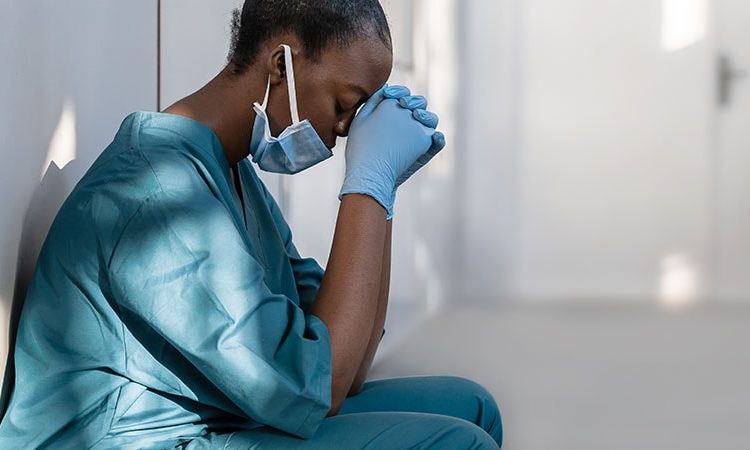More than half of physicians reported feeling burned out this year and nearly 1 in 4 doctors reported feeling depressed — the highest percentages in 5 years, according to the ‘I Cry but No One Cares’: Physician Burnout & Depression Report 2023.
“Burnout leaves you feeling like someone you’re not,” said Amaryllis Sánchez, MD, a board-certified family physician and certified physician coach.
“When someone is burned out, they experience extreme exhaustion in the workplace, depersonalization, and a sense that their best is no longer good enough. Over time, this may spill into the rest of their lives, affecting their relationships as well as their general health and well-being,” said Sánchez.
When feelings of burnout continue without effective interventions, they can lead to depression, anxiety, and more, she said.
Burnout can persist for months to even years — nearly two thirds of doctors surveyed said their burnout lasted for at least 13 months, and another 30% said it lasted for more than 2 years.
The majority of doctors attributed their burnout to too many bureaucratic tasks, although more than one third said it was because their co-workers treated them with a lack of respect.

“This disrespect can take many forms from demeaning comments toward physicians in training to the undermining of a physicians’ decade-long education and training to instances of rudeness or incivility in the exam room. Unfortunately, medical professionals can be the source of bad behavior and disrespect. They may be burned out too, and doing their best to work in a broken healthcare system during an extremely difficult time,” said Sánchez.
Doctors who are suffering from burnout can negatively affect their workplaces and colleagues, said Katie Cole, DO, a board-certified psychiatrist and physician coach.
“They can show up disengaged, become more cynical, exhausted, and frustrated with lack of control or autonomy. This in turn creates a breakdown of the work community, because co-workers look up to doctors as role models and leaders. Co-workers then can lose respect for doctors, which further causes more burnout and even depression,” said Cole.
About one third of doctors reported that their personality traits (eg, being a perfectionist) contribute to their burnout. One respondent commented, “My perfectionism leads to way more charting time after office hours, contributing to a worse work/life balance.”
Does Burnout Lead to Depression?
Experts who have studied burnout and depression say the conditions are different — burnout is an occupational syndrome whereas depression is a medical condition. However, if burnout is left untreated, it can contribute to depression.
About two thirds of doctors said that job burnout was the top reason for their depression, followed by world events (43%), and then being a physician (30%).
“It is possible that burnout can contribute to depression in some physicians. In turn, we know that depression is a risk factor for suicidal ideation, so burnout could indirectly increase the risk of suicide by contributing to depression. But most physicians who experience burnout do not experience depression,” Christine Sinsky, MD, AMA vice president of professional satisfaction, said in an AMA article.
Among the 23% of physicians who said they were depressed, about two thirds said they had “colloquial depression” (sad, blue, feeling down) compared to about 1 in 4 who said they were clinically depressed.
Seeking Help
Stigma often prevents physicians from confiding in others. Only 14% of physicians said they would talk openly about their problems to many people, whereas about half said they would confide in a few close friends or family members.
The top reasons the respondents gave for not seeking help were: “depression says something negative about me,” “I am afraid people will think less of my professional abilities,” and “I am afraid that the medical board or my employer will find out.”
Physicians are trained early on to sacrifice their own self-care and emotional needs in order to care for patients, said Cole.
“Many times, physicians are ashamed or embarrassed to admit that they may be dealing with depression because they see depression as a weakness. Also, physicians fear losing their medical license because of mental health questions on credentialing and licensure applications,” said Cole.
Other barriers to receiving help for depression include lack of awareness or availability of support; concern about confidentiality of treatment; negative career implications; and the lack of time to receive help while practicing clinical medicine, said Cole.
Sánchez reminded healthcare administrators that “organizations need to provide the resources necessary to address the mental health needs of physicians and that they can trust that those conversations will be kept confidential.”
Christine Lehmann, MA, is a senior editor and writer for Medscape Business of Medicine based in the Washington, DC area. She has been published in WebMD News, Psychiatric News, and The Washington Post. Contact Christine at clehmann@medscape or via Twitter @writing_health
For more news, follow Medscape on Facebook, Twitter, Instagram, YouTube, and LinkedIn
Source: Read Full Article
